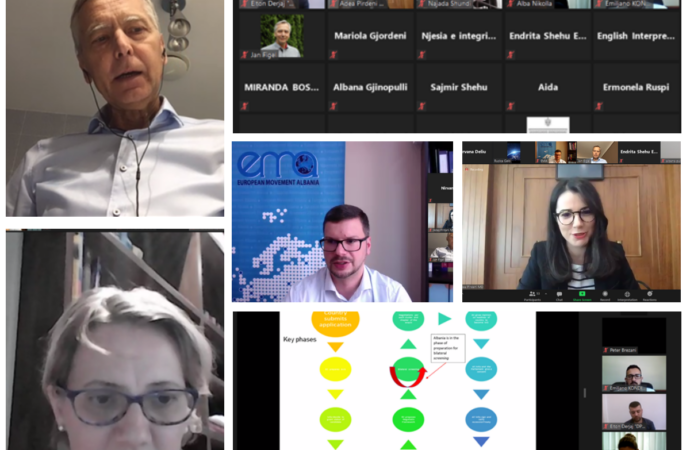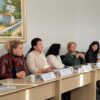The Ministry of Justice and the European Movement in Albania (EMA), in partnership with the Slovak Association for Foreign Policy (SFPA) and with the financial support of Slovak Aid, held on 29 June 2021 the virtual activity on “Bilateral meetings within the screening process – experience and preparations of the negotiating team for chapter 23”.
Gledis Gjipali, Executive Director of the European Movement in Albania (EMA) moderated the session and spoke about the importance of Chapter 23 in the European integration process. He said that civil society has an important and contributing role, mentioning the establishment of the Partnership Platform on European Integration. Gjipali added that the identification of key issues and the unification of the attitudes of all actors involved, facilitate the fulfillment of the conditions required by the EU.
Mrs. Adea Pirdeni, Deputy Minister of Justice and Negotiator for Chapter 23, during her opening speech thanked the experts and all participants. She said that the Ministry of Justice, in cooperation with civil society actors, is promoting and expanding the capacities of the structures involved in the integration process. Pirdeni also briefly commented on the EU decision not to move forward with the negotiations for Albania and North Macedonia. She said that this informative meeting is a good opportunity to benefit from the experiences of countries such as Slovakia and Croatia, where it is important to focus the approach on the outcome. She pointed out the political component in the decision-making process and said that we should be prepared for the challenges in the screening process. In addition, Pirdeni stated that the New EU Enlargement Methodology aims for credibility and predictability of the process.
Mr. Jan Figel, former EU Commissioner and former chief negotiator for Slovakia’s accession to the European Union, spoke about the enlargement process and said that EU policy was successful but not yet complete. Figel gave an overview of the history of relations between Slovakia and the EU and analyzed the implementation of the local membership referendum. Albania should maintain good relations with the European Commission and exercise caution in implementing the necessary reforms. The former Commissioner said that given the large number of structures involved, there should be institutional stability and increased administrative capacity. Finally, Figel said that European integration should be viewed positively as it could not be imposed, and that this process should be carried out in Albania by Albanians for Albania.
Ružica Gelo, expert on the European integration process of the candidate and negotiating countries for some chapters of the EU-Croatia negotiation process, explained the next steps in the opening of the First Intergovernmental Conference. Reforms begin and end with the political will and readiness to change society. With the start of negotiations and the opening of the conference, there will be a high-level meeting with representatives of both negotiating parties, followed by a technical-level meeting with a focus on Chapter 23. This phase gives Albania the opportunity to assess the degree of law harmonization achieved with the EU Acquis and the ranking of the other achievements. The focus is on implementation and the plans for the future as the European Commission closely monitors the whole process. In addition, the EC requires presentations based on the agenda of explanatory meetings or, in some cases the completion of questionnaires. The 2020 EC report for Albania shows that there is no proper reporting and no reliable system that leaves room for improvement in the legal, human, and budgetary areas. Gelo added that the experts should be natives and that the lack of English language should not be a problem.
Mrs. Najada Shundi, Head of the European Integration Unit in the Ministry of Justice, gave a clear overview of all the phases Albania has gone through in European integration so far. It started with the signing of the Stabilization and Association Agreement in 2006 and ended with the recent decision to postpone the First Intergovernmental Conference. Shundi also spoke about state structures and inter-institutional groups responsible for the negotiation process. She also clarified that the explanatory session on Chapter 23 took place on 27-28, September 2018, in Brussels. The acquis for this chapter consists of a volume of 126 acts, “hard acquis” 61 acts and “soft acquis” 65 acts and is divided into three thematic sub-chapters: Sub-chapter “Judicial System”; Subsection “Anti-Corruption” and Subsection “Fundamental Rights”. The process of creating Tables of Concordance (TOC), which has not yet been completed for this chapter, began in 2019. In parallel, work on IAGA (Institutional and Administrative Gap Analysis for the structures covering the acquis) continued. An update of the LGAs including the results of the ToC was carried out in 2020. During 2021, the work continued and all results of the LGA, ToC and IAGA documents will continue to be consolidated. Finally, Shundi mentioned the establishment of the Platform for European Integration and Foreign Technical Assistance.
Open discussion: Questions were raised on how to strike a balance between the New Enlargement Methodology and the nationalization of the process by the Member States according to their interests, on important reforms to promote the process, the differences between roadmaps and action plans and the role of civil society and academic field in the integration process.



















